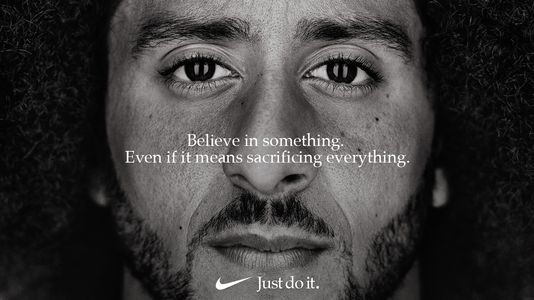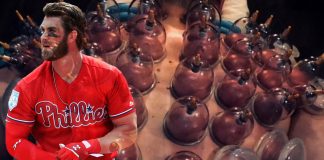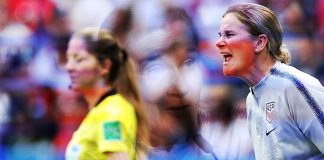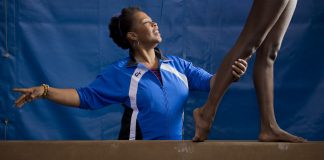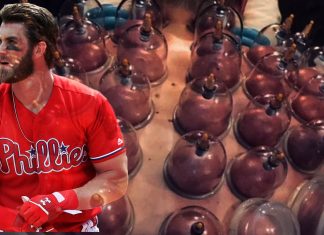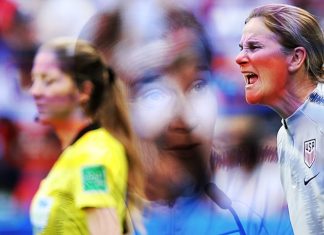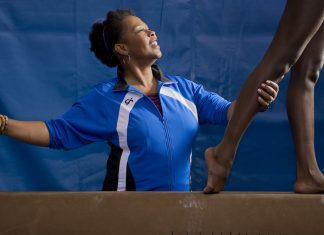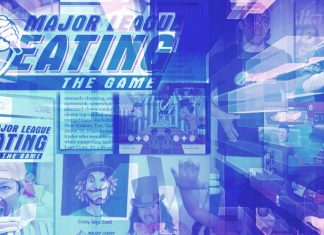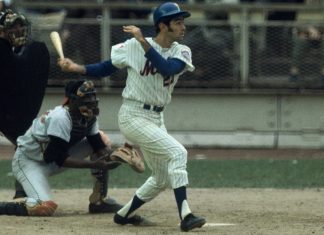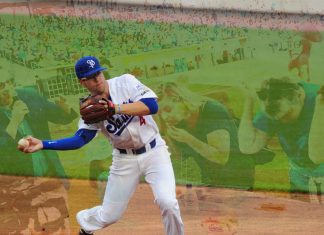Trivial traces of blue and gold Flashes
restitution for a life of “Not good enough.”
The MACC lights are halogen orange, buzzing, humming burning bright;
it’s destiny.
I want my jersey hanging,
for guts and glory,
number 24,
there next to you.
The sadness dripped from underneath soft white lights, and the air sucked from the old cinderblocks of the Memorial Athletic and Convocation Center (MACC) conference room into an invisible vortex right above Coach Waters’ forehead.
What did he just say?
“So wait, Coach, you’re leaving for Rutgers, like, for good?” I asked, completely blindsided.
Coach Waters stood up. He was alone with us, standing at the head of the semi-circle, his round black almond-shaped eyes blinking furiously. Today he seemed on edge, and coach Waters was never on edge.
“Yes,” he said. “I will be stepping down as the Kent State head men’s basketball coach.”
Gary Waters is a religious man. He has ethics. And he wanted to let us down easy by saying it in person, but this didn’t feel easy. He had been interviewing for new coaching jobs for almost a month. With Michigan. Miami of Florida. Illinois. Rutgers. And we had just beaten Indiana in the 2001 NCAA tournament—Dane Fife, Jared Jeffries, and Tom Coverdale— and Coach Waters’ name was on the coaches-for-hire map.
His dark black ovals blinked again, and his bottom lip quivered as he spoke. Coach Waters was always speaking into us, not at us, but this time he stared into an invisible space outside our arena’s walls, above our faces, outside this place I had made home. Today, he was a different person. This wasn’t the man I knew. This wasn’t the man who had taught me how to back tip a dribbler and pressure players into corners for our run and jump press. This wasn’t the man who yelled “43” and screamed to work harder. This wasn’t the man who had made us wake up at 6:00 in the morning for Bible study. This wasn’t the man who had us carry a 45-pound plate above our head while running stairs because one of our teammate’s was late for shootaround. And this was definitely not the man who taught me how to stand on my own two feet and fight.
No, Coach Waters wouldn’t leave us.
He had preached togetherness and family and love and purpose. He taught me if you want something, you have to fight for it—tooth and nail, bloody lip and black eye, until every last ounce of you is left splayed open on parquet floors for the world and ESPN and God to see. But “GW” we called him, had called us in for our second meeting that week after our second-round NCAA Tournament loss to Steve Logan, Kenny Satterfield, and Bob Huggins’ Cincinnati team. It was our second NCAA Tournament in three years, which was a huge success for Kent State.
“Gentlemen,” he said quietly. “God has spoken to me, and I have decided to leave for Rutgers University. I’ve always said I would only leave Kent for three reasons. One—to be in a top league in the country. Two—to be in a place that has a 50-mile radius for great recruiting. Three—to make my wife happier and win a National Championship.”
No one smiled. I thought I heard Kyreem cough “bullshit” under his breath.
“Is everyone going with you, coach?” Drew Mitchell asked.
“Yes, Coach D and Coach Heck are going, and Coach Mance will stay. It will be up to you if you want him to stay on and coach you.”
“Coach, can we come with you?” I asked suddenly, my voice wavering. “To Rutgers?”
There was a long pause. Players shuffled their feet under the table, clasped their white or black hands into fists, and looked at each other. Mike Perry, our 6-foot, 11-inch center and one of my closest friends, bore laser holes into my eyes’ sockets. But GW didn’t answer. The silence hit hard. I felt something burn above my gut like someone had stamped a cigarette into my chest and let it burn through to my heart. There was heat melting off my face like I was drinking napalm.
“Trevor, you alright?”
I shook my head.
“Hell no, I’m not alright,” I thought. “This is fucking treason.”
I looked directly at GW, blinking back the bitterest of tears. Something inside me wanted to break apart and melt and explode and char like Hiroshima. I thought of my younger brother, D2, and my older brother, Jeremy, and all our one-on-one battles in our driveway. I thought of my dad taking me into inner-city Flint, to the ends of the Earth to play against the best players in the world. I thought of my Kent walk-on tryout and then my last-second scholarship offer from Coach Waters. I thought about not starting for two years. I thought of our basketball family, of the sacrifice, of these guys—the team. They were my brothers, and GW was like a father.
“He can’t leave,” I thought. “Coach Waters is the only coach I’ll play for, he gave me this chance.”
The preacher left,
packed his black bible to sing another gospel East.
“Words of Wisdom,”
gone for good.
I sense the end in me,
first a father, now a priest,
a liar, a sinner, a rock thrower.
My mind spinning,
my heart the five stones
of David and Goliath’s decision
sinking in the great wide blue,
thump-thump, thump-thump,
thumping as dark and heavy as the bottom of the Black Sea.
Trevor?”
“Yeah, what’s up—who’s this?”
“You’ve been invited to the under-21, Olympic USA national team,” a voice crackled on the other end of my silver, Nokia flip phone. I was driving somewhere near Charlevoix, Michigan.
“What?” I said, looking at the number. It was blocked.
“Yes, you have been selected as one of the top players in the country and have been invited to our Team USA selection in Colorado Springs in July. Are you interested?”
My heart jumped into my throat like a Petoskey bullfrog croaking in Walloon Lake. “I, uh—like yes,” I said, gulping. “Of course, I’d love to…I want to try out.”
“Great. We’ll send you the info via Kent State’s coaching channels.”
“Yes, thank you.”
My mind sped up. Who was that? Was that Coach K? Bob Huggins? Coach Boeheim? Billy Donovan?
I slammed my balled fist into the steering wheel and my 1989, maroon Subaru Legacy swerved. I was driving on 131 past the white, horizontal, plastic feed silos and endless fields of green. To my left, I could see Lake Michigan’s turquoise and royal blues to the end of the horizon.
Suddenly, I realized something was wrong. A car was headed directly at me. I looked at my dashboard—I was going 90 miles per hour.
I swerved again, and this time I spun like a whirling dervish into the gravel median. Dust and green fields and blue lakes and sand and green forests and blue lakes whizzed around me as I spun 360 degrees. I finally came to a stop.
My hands shook.
Was that Coach K?
Breathe, Trevor. Breathe.
But I couldn’t breathe. I was going to play against future NBA stars. It was my time to shine. No guts, no glory. Jay Williams. He would be the number one pick. Frank Williams from Illinois. Chris Duhon, Mike Dunleavy (the number two pick), Carlos Boozer from Duke. Kirk Hinrich and Drew Gooden from Kansas. Dejuan Wagner from Memphis. Chris Wilcox from Maryland. Caron Butler from UConn. Jared Jeffries (from Indiana, whom I had just beat). Dan Dickau from Gonzaga. Rod Grizzard from Alabama. The list of players running through my thoughts immediately hit me. I had never played AAU on the national scale, never seen that much talent in one gym.
I got control of myself, took one last deep breath, and drove my car straight to the only house in Petoskey that could help me and was always open (besides my mom’s). I got the keys from my high school coach, Dennis Starkey, and headed back from his College View Drive to Waukazoo Street, past the quaint homes and neatly trimmed lawns and turned left towards the place where all my childhood dreams came true: Central School Gym.
Nestled inside a tiny elementary school in downtown Petoskey, this is where I made my college hoop dreams happen. I put on my Nike team shoes as the bright white, neon bucket lights crackled and buzzed on above me. A tingle spread—an energy. I took a deep breath and let the wood floor and dark blue lines with the high gloss sheen sink into me. I had so many memories here.
Yet, something inside me was lingering about the thought of Coach Waters. Where was he? What was he doing? Was he happy there?
My question to transfer and go to Rutgers University with GW still loomed in my mind. He had signed a multi-year, million-dollar contract after our March Madness Cinderella story. I still had time to follow him. GW had taken a chance on me. Should I take the chance back and go?
I shut my eyes and took a breath, smelling popcorn and old sweat. I felt the energy of standing room only crowds and remembered our pep band crashing the sticks of their steel and bass drums as opposing teams ran into the bright lights of Central Gym. I remembered Coach Starkey standing over us, like a general, shouting to his troops.
The Petoskey Northmen were invincible there—at Central Gym.
As an athlete, you get attached to these memories and coaches and feelings. They become wrapped into your identity like DNA. This was where my vision of college basketball started, wrapped in the steel rafters of baby and navy blue, wooden seat backs and bleachers that wrapped around the gym in an intimate horseshoe. This was the city where my mother raised me. This was my peace and solace and therapy. It was here that we beat and played some of the best high school teams and players in the state of Michigan. Shane Battier at Country Day. Duez Henderson and Brent Darby with River Rouge. Luke Johnson and Gaylord. Ryan, Jeff, and Doug at Traverse City Central.
People used to tell me there were two-mile lines of people down State Street our senior year playing for Coach Starkey. With Johnny. Fire and Ice. My teammates. Our song, Sean Ryan’s “The Northmen Kind of Night.”
Petoskey was on fire in 1998, and it was my home, just like Kent State in 2001.
I smiled, and like a child, felt a playful force grow inside me. It was time.
I cinched my shoelace and picked up two basketballs and started my dribbling routine. Sideline to sideline. In and out. Over and around. Behind the back and back again. I whipped the leather orb around me as hard as I could until I lost the ball or did it correctly. Alone in Central Gym with a basketball is where my demons died, where they got spit out of me like lob dunks. I’d touch the floor with one hand and then crossover and then spin and then do it again, back and forth and ram the ball through the hoop.
I must have shot 1,000 shots that night. I dreamt of wearing the red, white, and blue of Team USA on my chest and wondered where my next college basketball home would be.
God gave me the leather ball and a dream,
but it was up to me to meet Him there,
halfway,
in the middle.
“Yeah, that sounds fair.”
You can’t go, coach,” I said, my stoic facade finally breaking. “You gave me this chance. No one else gave me this chance. No one believed in me.”
I lurched forward trying to cover the burning hole coming through my chest. I was never supposed to be a D1 player or try out for Team USA or end up where I was. I had been a week away from signing at Hope College, a D3 school, or Mott Community College, a D2 community college in Flint. I remember praying every night to God to answer my prayers, “Please lead me to the right decision. Please give me a chance.”
My prayers had been answered. Coach Waters’ gave me a scholarship a few days before my freshman year started, but I wasn’t able to understand the business or dynamics or the tug and push of money in college sports. I couldn’t fathom or understand why GW was leaving us.
“Now, Traavor,” Coach Waters responded. “You can’t come with us. You gotta stay here. You’ll be just fine without us. Y’all are seniors now. Make us proud. We will never stop being there for you,” he said, picking up tempo and putting more vigor and meaning in his words. GW was a six-foot, Black man with square shoulders and a thin mustache, and had a Billy Graham, evangelist delivery. He constantly dropped his dry erase marker when he coached due to his brittle and bony, broken pinky finger. GW had the Rapture inside him.
“God will answer your prayers. But you guys gotta stay together and be the family we taught you to be—everyone will need each other now.”
I put my head into my arms. And broke. I couldn’t finish my senior year. Not now. I was done.
The tears hunted me in heaving sobs. I couldn’t stop them. I tried to hide the sadness, but it streamed down my face in a river and pooled on the white, tile floor below me. I was soft. I felt my teammate’s eyes on me. But they didn’t know how much I cared being here—how many nights I had vanished in the MACC to control my demons and master my craft—how much this opportunity meant to me, to even be here—to even get the chance to play D1.
Drew. Shaw. Kyreem. Ray. Mike P. ET. E-Haut. Big John. Brian. Roach. Matt. Pope. Al. Geoff. Nate. All the guys before me that had played for GW.
“Trevor, you’re gonna be okay, my dude,” Drew said. “Stop crying. We got you—we got you.”
I had always believed Drew, but not today. I wanted to die and disappear into nothing, melt into the walls and slide under the floor away with my future at Kent State. The NCAA tournament and our Cinderella story had stolen any loyalty or trust I had left in me. It was gone forever.
Trevor Huffman is a former professional basketball player and contributor at Grandstand Central. His new podcast, ‘The Post Game’ looks at the game after the game, as he speaks with retired athletes about life beyond sports. Subscribe here.




